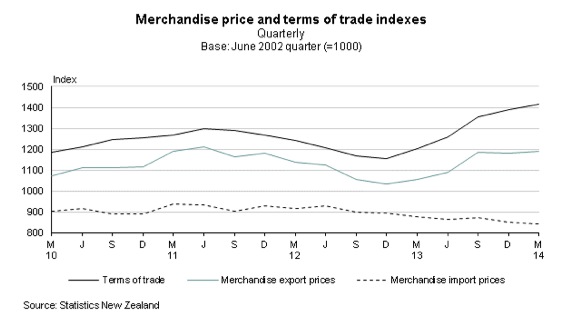New Zealand’s terms of trade edged closer to an all-time high in the first quarter as dairy products led a gain in export prices and petroleum products led import prices lower.
Terms of trade, which measures the quantity of imports the country can buy with a set amount of exports, gained 1.8 percent in the fourth quarter to the highest level since September 1973, according to Statistics New Zealand. It is now just 1.7 percent below its all-time high in the June 1973 quarter. The quarterly gain matched expectations in a Reuters survey. (See graph below)
The terms of trade may be close to peaking, as prices of dairy products have tumbled 23 percent on the GlobalDairyTrade platform in the past four months. Dairy prices rose 2.3 percent in the first quarter and have gained 42 percent in the year to be within 4.7 percent of a record level reached in the fourth quarter of 2008, today's figures showed. Dairy led a 4 percent drop in the ANZ Commodity Price Index in April, to an eight-month low, and data for May, due out tomorrow, is expected to show prices fell further.
"There will be some correction" in the terms of trade, said Robin Clements, senior economist at UBS New Zealand. "They will still remain very high compared to historical trends" but "the momentum of growth, the contribution to nominal GDP, will be down."
Export prices overall rose 0.8 percent in the first quarter. Among other gainers, meat advanced 2.1 percent and was up 6.6 percent in the year, to be 9.7 percent below its June 2011 peak. Forestry prices gained 1.6 percent in the quarter and 10 percent in the year.
Import prices declined 1 percent, led by a 3.5 percent drop in petroleum products, which were also down 3.5 percent in the year. Electrical machinery import prices fell 1.8 percent in the quarter and 12 percent in the year. Prices of fertiliser jumped 17 percent in the first quarter to be down 14 percent in the year.
Export volumes rose 1.6 percent in the first quarter, led by meat while import volumes gained 2.3 percent.
The trade-weighted index was recently at 78.98, down from 79.19 immediately before the data was released. The TWI rose 1.8 percent in the first quarter, which has a downward influence on both export and import prices.

(BusinessDesk)
Wed, 11 Jul 2018

